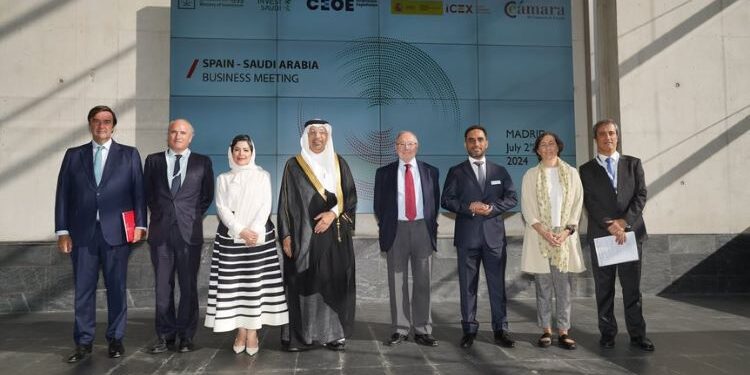The Diplomat
The Saudi Arabian Minister of Investment, Khalid Al-Falih, said yesterday in Madrid that Saudi companies see Spain “as a gateway to Europe and Latin America”.
Khalid Al-Falih held a meeting with the Minister of Economy, Trade and Enterprise, Carlos Cuerpo, and participated in a Spanish-Saudi business meeting, held at the headquarters of the Spanish Chamber of Commerce and organised together with the Secretary of State for Trade through ICEX Spain Export and Investment and CEOE.
At the meeting, the minister described the growth of Spanish GDP in the last two years as “impressive”, and after stressing that Spain is “at the forefront of Europe”, he insisted that Saudi companies see Spain as a gateway to Europe and Latin America”.
He also highlighted the role of his country as a “platform” for Spanish companies in the Middle East, stressing that “more than 200 Spanish companies do business in Saudi Arabia”. Specifically, he recalled that Spanish companies have already won more than 70,000 million in contracts in Saudi Arabia, but the “potential is to grow more” in number of contracts, as well as in exports. “Saudi Arabia is open to business and investment, it is willing to welcome companies and facilitate joint trade or investment contracts,” he said.
For his part, the President of the Spanish Chamber of Commerce, José Luis Bonet, highlighted the “fundamental role” that Spanish companies “have played and can continue to play” in the diversification of the Saudi productive system and in its competitiveness. “Saudi Arabia -he said- is embarked on an ambitious process of economic transformation that consolidates it as a reference and power at regional and global level”.
The President of the Spanish Chamber of Commerce also recalled the objectives set out in the Vision 2030 Plan, and the existence of a favourable regulatory framework and incentives for private investments, as well as an agenda of public investments in infrastructure and services. “From the Spanish Chambers and Business Organisations, we want to join this commitment and continue to support the work of the Spanish-Saudi Business Council and the dialogue with both governments, redoubling our commitment to the public-private partnership that we defend and represent”, concluded Bonet.
The Vice-President of CEOE, Julián Núñez, also stressed that Saudi Arabia is a very attractive market, as it has abundant resources, an ambitious state infrastructure programme and, above all, a policy of economic and business diversification, with a great interest in the expansion of the private sector. He also congratulated the Saudi government on its ambitious Vision 2030 Plan, which will diversify and modernise the Saudi economy by developing public services, infrastructure, opening up to tourism and promoting the entertainment industry.
On the other hand, he stressed that the opening of Saudi Arabia to the rest of the world is creating a unique investment environment and emphasised, in this regard, the importance of public-private collaboration when carrying out new projects in the country, and thus facilitating their implementation and execution. Finally, he pointed out the global leadership of Spanish infrastructure companies and the importance of the Middle East and Saudi Arabia in their business figures, which show enormous potential in the country.
Alicia Varela, Director General for International Trade and Investment, agreed that “Saudi Arabia is our main trading partner in the Middle East: the region’s main supplier and client”, and once again pointed out that the Vision 2030 Plan’s strategy to diversify the Saudi economy offers enormous opportunities for Spanish companies.
During the meeting, which was attended by 200 Spanish and Saudi companies, convened to strengthen trade ties and the flow of investment between the two countries, several round tables were held to discuss the business climate in Saudi Arabia, the keys to the establishment of companies and success stories of Spanish companies with a presence in the country. The day concluded with information sessions for specific sectors: Architecture/Construction/Engineering; Waste and Water Management; Renewable Energies; and Agriculture and Food Processing.
Meeting with Minister Carlos Cuerpo
Khalid Al-Falih also met with Carlos Cuerpo, with whom he discussed various investment opportunities between the two countries in a context marked, among other issues, by the failure to finalise the entry of the Saudi telecommunications company STC – which is 64% owned by the Saudi sovereign wealth fund (Public Investment Fund, PIF) – into Telefónica.
Sources familiar with the talks between the two ministers told Europa Press that STC’s intentions for Telefónica were not put on the table during the meeting.
Last September, the Saudi operator surprisingly acquired 9.9% of Telefónica’s capital – 4.9% in direct shares and 5% in financial derivatives – in a transaction valued at 2.1 billion euros.
However, in order to realise this 5% in financial derivatives, it must send a letter to the government detailing its intentions in the operator chaired by José María Álvarez-Pallete.







